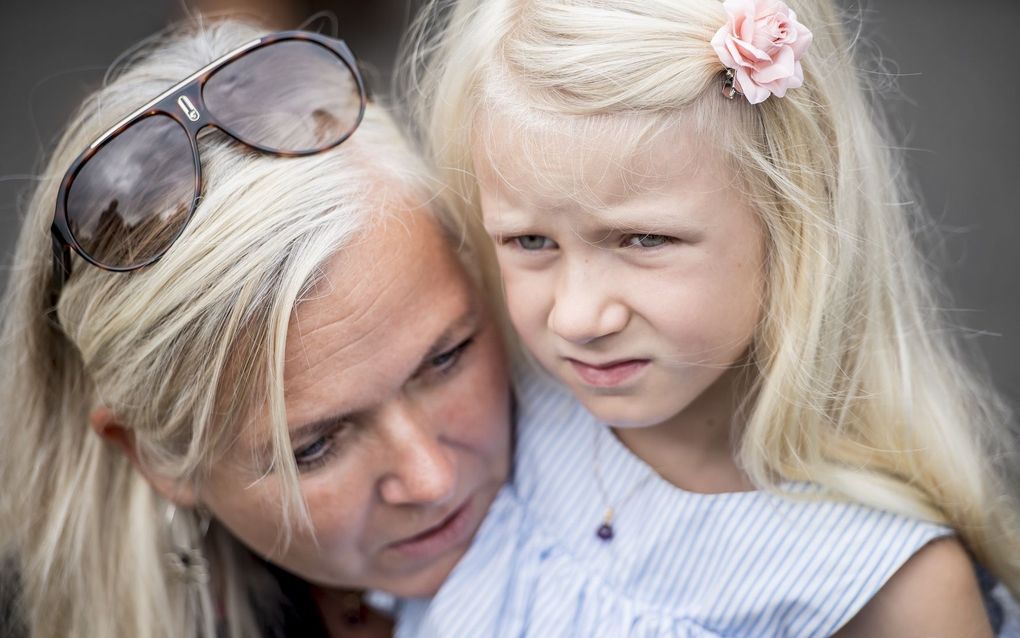Dutch teacher: Parents, talk openly to children about sexuality
17-06-2022
Opinion
Gerdien Lassche-van Grol, RD

Mother and child. Not related to the content of this article. Photo EPA, Claus Rasmussen
Opinion
Children and young people have the right to honest sexual information. Parents can start this education when their children are young by talking about it in their daily life. Tell them about God's meaning for sexuality.
Talking with your child about subjects like sexuality, sexual intercourse, preventing pregnancies, and sexually transmitted diseases (STDs) seems to be a bridge too far for too many parents. About 75 per cent of the students who participated in research of the Dutch daily Nederlands Dagblad said so. Many students also added that they watched pornography and struggled to break this habit. This research is, therefore, a mirror for us as parents and leads to many questions.
Sexuality is a topic that is not easy to talk about
Everyone understands that sexuality is not an easy topic that you can 'just' discuss. But in this time of sexual confusion, a good conversation with your child is crucial.
And do not young adults, in a time when many types of genders are presented, especially have this need? At the kitchen table, during a car drive or a walk, at night by the campfire. Often, these moments are particularly suited for a deep conversation, especially about sexuality.
Children and young people have the right to honest sexual information. Parents can already start teaching their children at a young age by talking about sexuality in daily life. Children do not find it strange when you, considering their age and character, tell them bit by bit about how the Lord created us and what He meant sexuality to be.
Talk also about boundaries and self-control. Mention that God asks us to control our sexual feelings and keep them for marriage only. When parents are open about this, children feel the space to be honest.
Public opinion on sexuality has entered the Christian community
The research of the Nederlands Dagblad also showed that it is crucial to talk about these issues honestly. That is an essential task for parents.
But in addition to this appeal to parents, the respondents to the research could be asked the question: Can the criticism of parents who did not talk enough about sexuality be an excuse for young people to extend their sexual boundaries?
According to researcher Van Dijk, public opinion has crept into the Christian community. Convictions shift, even when they concern marriage or keeping sexual relations exclusive for marriage. Having sexual intercourse before marriage with a stable partner or fiancé automatically expands a boundary. If the courtship ends and a new relationship starts, the person will also have a new bed partner.
The Dutch research shows that young people have questions about preventing pregnancies and STDs and how parents experience intimate issues. It is good that parents are honest about these topics as well.
General scientific research proves that parents and caretakers influence the later sexual experiences of their children. Children who receive decent education will start with sexual activities later.
Openness and honesty do not mean that you have to expose yourself completely. Young adults will understand that questions about how often you and your spouse have sexual intercourse and what you like best are private.
Influence on sexual development of children
Let us transfer our norms and values concerning sexuality, just like we talk about religious matters, choice of clothing, financial decisions and choosing a job in our families. The bedding of Christian upbringing and shaping of consciences is essential for the development of young people in the area of sexual relationships before marriage.
Dutch Prof Dr J. Waterink writes in his book "Aan moeders hand tot Jezus" ("Going to Jesus holding mother's hand" ): "Poor parents who try to speak about religious issues with their child when their child discovers more and more that father and mother tell him lies about sexual issues. (…) Especially the insecurity that children experience after they discover sexuality is often the reason for religious doubt. Therefore, step over your own embarrassment, for the sake of your children, past the discomfort."
Dilemmas
During conversations about sexuality, parents may experience dilemmas:
1. Is my child too young for sexual information?
Parents cannot start too early by offering sexual information or upbringing. Sexual education fits every stage of development. You do not have to teach your children with a serious conversation. Instead, you can do this step by step over the years. It helps if you, as a parent, increase your knowledge about sexual development.
2. Do I not give my child bad ideas when talking about sexuality?
Often, parents want to let sleeping dogs lie - "if you talk about it, they will start doing it." However, research shows that these fears are unjustified. Children who grow up in a warm family which gives sexuality a place in their upbringing are more able to make the right choices. Furthermore, they are less likely to be confronted with unwanted sexual encounters.
When there is more openness on the topic, children and young people learn how to be clear about their own boundaries, inside and outside the family. Hopefully, this prevents (long-term) abuse (incest).
3. My child does not ask questions.
Not all children ask questions about sexuality. Some children ask very few questions in general. But would that mean that they receive fewer answers as well? Some children have questions about sexuality but do not dare to ask them because they feel the topic is taboo. Taking the initiative to talk about sexuality as a parent can break this taboo.
4. What if I feel uncomfortable with it?
Children sense it when parents would rather not talk about sexuality. For that reason, they stop asking questions. Admit that you find it hard. Or tell them you are not used to speaking about the topic. Keep the conversation light. It does not always need to be a long talk; common statements, with or without a bit of humour, can already be meaningful. By building up experience, your self-confidence will grow.
But my child already receives sexual education at school
The Dutch Reformed Parent Association (ROV) notices more and more that parents leave sexual education to the schools. Every school does teach lessons about sexuality. That is even mandatory for schools in the Netherlands.
The good part is that pupils will continue talking about it among each other but also with the teacher as soon as they attend secondary school. The condition is that they have to feel safe enough to do so. Yet, there will always be questions that are not answered, even if young people have them.
The author is a policy officer for the Dutch Reformed Parent Association (ROV), teacher and board member of a Dutch platform for families, GezinsPlatform.NL.
This article was translated by CNE.news and published earlier by Dutch daily Reformatorisch Dagblad on May 31, 2022
Related Articles






